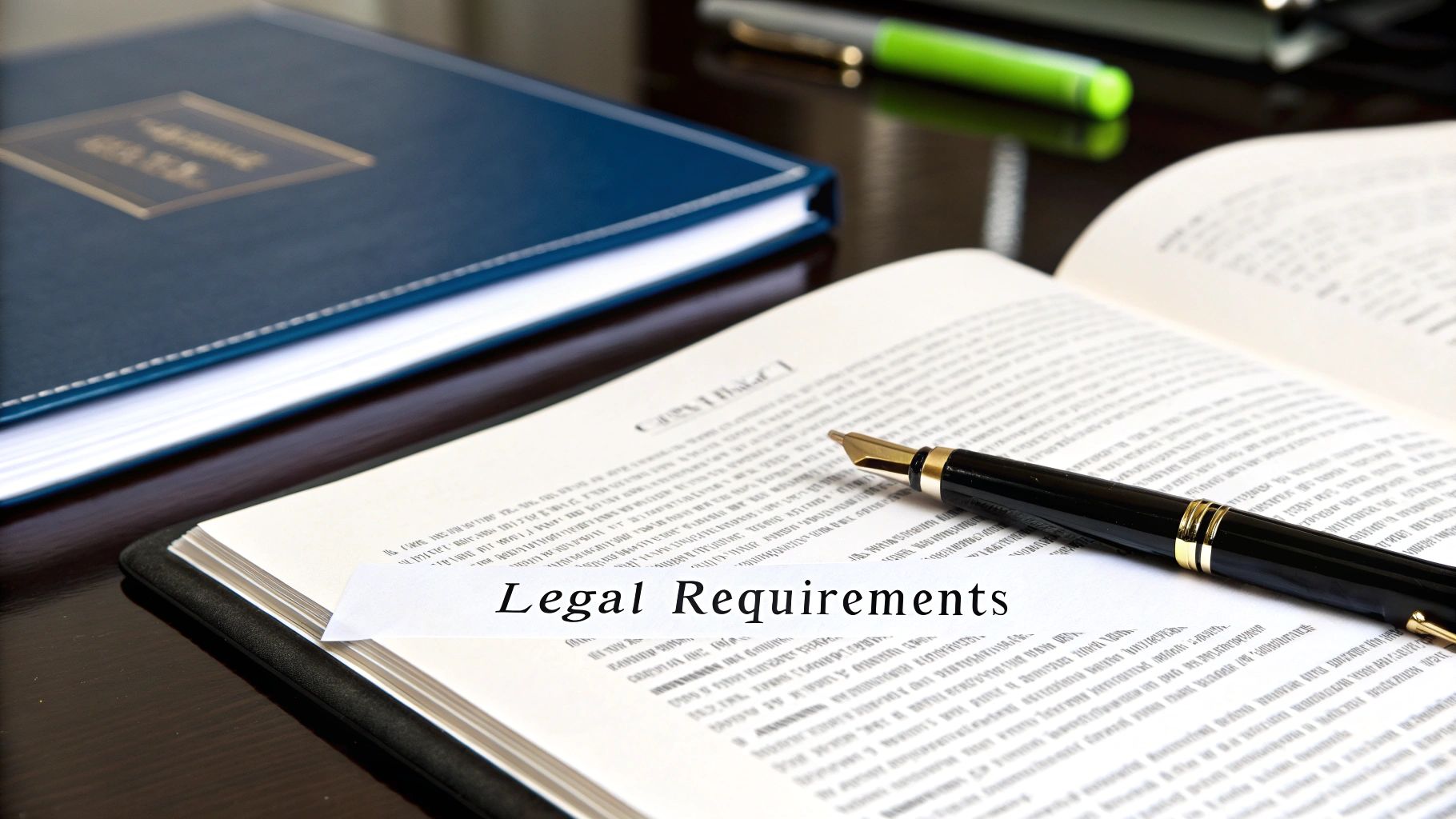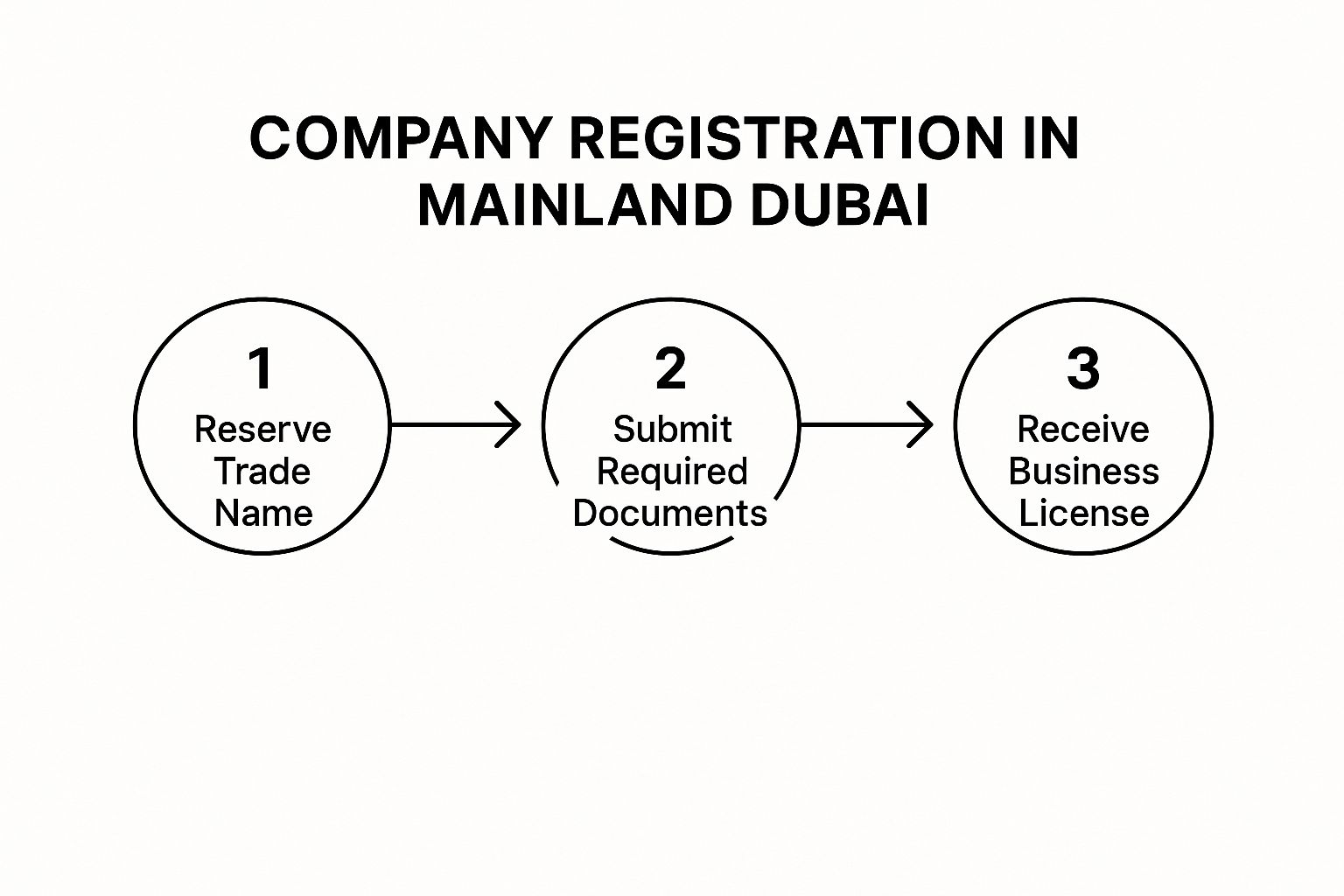Thinking of setting up shop in Dubai? Going for a mainland company gives you direct access to the entire UAE market, which is a massive advantage for most entrepreneurs I work with. It all boils down to getting a trade licence from the Department of Economy and Tourism (DET). Once you have that, you can trade freely across all the Emirates without any roadblocks.
This guide will walk you through the entire mainland Dubai company formation process, breaking it down into simple, practical stages.

Getting Started in Mainland Dubai
Choosing to launch in mainland Dubai is a strategic move to position your company for serious growth and market reach within the UAE. Unlike other setups, a mainland licence means you can deal directly with local customers, bid on those big-ticket government contracts, and open an office or shop anywhere you like. This is the main reason business owners go down this route – total operational freedom.
It all starts with your business goals. What's the plan? A retail store in a busy mall, a high-level consultancy, or a trading company? Your vision will shape every decision you make, from picking the right business activity to choosing a legal structure. It's always a good idea to brush up on general strategies for international business expansion before diving into a new market like this.
Why Mainland is Often the Right Choice
The first big decision you'll make is whether to go for a mainland, free zone, or offshore setup. Each has its own perks, designed for different kinds of businesses.
Here's why many opt for the mainland:
- Full Market Access: You can operate anywhere in Dubai and across the other Emirates. No need for a local agent or distributor.
- Government Contracts: Mainland companies are eligible to bid for and win lucrative government projects. This is a huge market that's pretty much off-limits to free zone businesses.
- Wider Scope: The list of available business activities is much broader compared to the more specialised free zones.
- Visa Flexibility: The number of visas you can get is tied to the size of your office. As you grow and need more space, you can apply for more visas. It's built for scaling up.
Mainland vs Free Zone vs Offshore At a Glance
To help you see the differences clearly, here's a quick comparison of the three main jurisdictions in the UAE. This table should make it easier to figure out which path is the best fit for your venture.
| Feature | Mainland Company | Free Zone Company | Offshore Company |
|---|---|---|---|
| Area of Operation | Can operate anywhere in the UAE and internationally. | Restricted to its specific free zone and international. | Primarily for international business; cannot trade in UAE. |
| Ownership | 100% foreign ownership for most activities. | 100% foreign ownership. | 100% foreign ownership. |
| Government Contracts | Eligible to bid for government tenders. | Generally not eligible. | Not eligible. |
| Office Space Requirement | A physical office is mandatory. | Can be a physical office or a flexible desk. | No physical presence required; virtual office is common. |
| Visa Eligibility | Depends on office size; generally no limit. | Limited number of visas, depends on the free zone. | No visa eligibility. |
| Taxation | 0% personal income tax, 9% corporate tax on profits > AED 375,000. | 0% personal and corporate tax (with conditions). | Tax-exempt. |
Ultimately, the best choice really hinges on your business model. If your goal is to be a direct part of the local UAE economy, the mainland is your best bet.
The process for a mainland company is managed by the Department of Economic Development (DED) in each emirate. While in the past you needed a UAE national to hold a 51% share, recent changes now allow for 100% foreign ownership for a huge number of business activities. This has been a game-changer for international investors.
The key takeaway is that a mainland setup is ideal for businesses that plan to trade directly within the UAE's local economy, require a physical office or retail space, and want the flexibility to grow their operations without geographical limitations. Our detailed guide on how to start a business in the UAE provides further context on this crucial decision.
Choosing Your Business Activity and Legal Structure
Before you even start brainstorming trade names or looking at office spaces, you need to nail down the absolute core of your business. This is the foundational step in your mainland Dubai company formation journey, and it’s all about picking your business activities and then matching them to the right legal structure. This isn't just about paperwork; it's the actual blueprint for your company's future, defining what you can do, who owns it, and where the liability lies.

The Department of Economy and Tourism (DET) in Dubai has a massive list of over 2,000 business activities to choose from. Your selection from this list is what directly determines the type of licence you'll get. It’s a critical decision because it dictates everything your business is legally allowed to do.
Think of it as declaring your specialisation. A general trading company operates under a completely different set of permissions and rules than a specialised IT consultancy. Getting this right from day one saves you from expensive changes and potential headaches down the line.
Decoding the Licence Types
Once you've pinpointed your activities, they will slot into one of three main licence categories. Each one is built for a different slice of the economy.
- Commercial Licence: This is your go-to for any business that involves trading, buying, or selling goods. It covers everything from a retail shop and an e-commerce store to major import/export operations.
- Professional Licence: Designed for individuals or partners offering specialised, service-based expertise. We’re talking about consultants, lawyers, designers, artisans, and doctors. A huge advantage here is the potential for 100% foreign ownership.
- Industrial Licence: You'll need this licence if your business involves manufacturing, production, or any kind of industrial processing. Basically, if you're turning raw materials into finished products, this is for you.
The licence you end up with is more than just a label; it directly impacts which legal structures are available to you. For a closer look at the nitty-gritty, our guide on the Dubai trade license breaks down the requirements for each type in detail.
Selecting the Right Legal Structure
Your legal structure defines how your business is owned and, crucially, who is responsible for its debts. This is a big decision with long-term consequences for both your personal liability and your company's flexibility. Let's walk through the most common options for a mainland setup.
Limited Liability Company (LLC)
An LLC is, by a long shot, the most popular choice for entrepreneurs setting up on the mainland, particularly for commercial ventures. Its main draw is that it shields the personal assets of the owners (the shareholders) from business debts and legal claims.
In the past, an LLC always required a UAE national to hold a 51% stake. However, major legal reforms now allow for 100% foreign ownership across a huge number of business activities, making it an even better option for international investors.
Sole Establishment
This structure is for one person who wants to run a business in their own name. It's most often used for professional licences. With a Sole Establishment, the owner is personally on the hook for all of the company's debts. For foreign nationals, this structure requires you to appoint a UAE national as a Local Service Agent (LSA).
It's important to understand that a Local Service Agent is not a shareholder. They hold no equity in your business and have no say in its management. Their role is purely administrative, and they are paid an annual fee for their services.
Civil Company
A Civil Company is basically a partnership for professionals in recognised fields like medicine, law, engineering, or accounting. It lets two or more partners team up to offer their professional services. Much like a Sole Establishment, partners in a Civil Company usually have unlimited liability, which means their personal assets could be at risk. This structure also needs an LSA if none of the partners are UAE nationals.
Picking the right structure really comes down to your business model. For example, a group of foreign architects would probably set up a Civil Company. On the other hand, an entrepreneur looking to open a new restaurant would almost certainly choose an LLC to protect their personal finances. Making the smart choice here builds a rock-solid legal foundation for your success in Dubai.
Getting Your Company Registered in Dubai
Once you've nailed down your business activity and legal structure, it's time to dive into the official registration process. This is the part where your great idea becomes a real, legally recognised company. You'll be working with the Department of Economy and Tourism (DET), hitting a few key milestones that get you closer to opening your doors.
It might look like a lot of paperwork, but if you take it one step at a time, it’s quite manageable. It all starts with giving your business an official name and getting the initial nod from the authorities.
Nailing Down Your Trade Name and Getting Initial Approval
First things first, you need to pick and reserve a trade name for your business. The name has to be unique and follow UAE naming rules—nothing offensive, blasphemous, or stepping on another company's trademark. My advice? Come up with three to five options, just in case your favourite is already taken. It saves a lot of back-and-forth.
After your name gets the green light, you'll apply for Initial Approval. Think of this as a preliminary certificate from the DET that basically says, "We're okay with you setting up this business." It's the permission slip you need to move on to the next stages, like drafting your legal documents and finding an office.
This chart breaks down the simple path from reserving your name to getting your licence in hand.

As the infographic shows, it’s a clear, step-by-step process. Each piece of the foundation has to be in place before the final licence is issued.
Drafting and Notarising Your Core Documents
With your Initial Approval secured, it’s time to draft the legal backbone of your company: the Memorandum of Association (MOA). If you're setting up an LLC, this document is non-negotiable. It spells out everything from the company’s purpose and share capital to the ownership breakdown and what each partner is responsible for.
The MOA has to be drafted in both English and Arabic, then notarised by a public notary here in the UAE. There are no shortcuts on this one; it’s what makes the agreement between shareholders legally official. For professional firms going the Sole Establishment or Civil Company route, you’ll need a Local Service Agent (LSA) agreement instead of an MOA.
A well-drafted MOA is your best defense against future partner disputes and provides a clear roadmap for how your business will run. It’s smart to get professional help here to make sure every clause is compliant with UAE Commercial Companies Law and truly reflects your agreement.
Once notarised, this document is a critical part of your final submission package. It's one of the last major hurdles before getting your official certificate of incorporation in the UAE, which is the ultimate proof of your company's legal status.
Securing a Physical Address with Ejari
Every mainland company in Dubai needs a physical office. You can't use a home address or a virtual office for this. You have to lease a commercial space and register the tenancy contract through the Ejari system, which is the official online portal managed by the Real Estate Regulatory Agency (RERA).
Your Ejari certificate is the official proof of your business address, and it's a mandatory document for your final licence application. The size of your office matters, too—it directly affects how many employee visas you can apply for later. Generally, a bigger office means a bigger visa quota.
The Final Submission and Getting Your Licence
You're at the home stretch. Now, you just need to pull all your documents together and submit them to the DET. This final package usually includes:
- The completed application form
- Passport copies for all shareholders and managers
- The original, notarised Memorandum of Association (MOA)
- Your trade name reservation and Initial Approval certificates
- A valid Ejari for your office space
- Any extra approvals from other government bodies if your business activity requires them
Once your submission is checked and approved, you’ll get a payment voucher for the trade licence fees. As soon as you pay, the DET will issue your official trade licence. This is the moment you've been waiting for—your company is now officially registered and ready to start operating in Dubai.
Understanding Your Financial Commitments
Let's be honest: a solid financial plan is the absolute foundation for a strong start in Dubai. Before you can enjoy the UAE’s amazing tax environment, you have to get real about the one-time and recurring costs of a mainland Dubai company formation. Knowing these numbers upfront helps you put your capital where it needs to be and, more importantly, avoids nasty surprises that can kill your momentum.

This isn't just one big payment. Think of it as a series of government and administrative fees you'll pay at different stages. From the moment you reserve your trade name to the day you get your final licence, each step has a cost. These can swing pretty wildly depending on your business activity, your legal structure, and any special government approvals you might need.
Breaking Down the Initial Setup Costs
The first phase of setup involves several mandatory government fees. These are the non-negotiables for building your company's legal framework. While the exact amounts can change, the core payments are pretty consistent for most new businesses.
Here are the key one-time payments to budget for:
- Trade Name Reservation: The fee paid to the DET to lock in your unique business name.
- Initial Approval Certificate: This covers the cost of the DET giving the preliminary green light to your business activities.
- MOA Notarisation: A fee for the mandatory attestation of your Memorandum of Association by a public notary.
- Trade Licence Issuance: This is the big one—the main government fee for your official licence to operate. It's often the single largest cost in this phase.
- Market Fees: These are calculated as a percentage of your office's annual rent and paid directly to the government.
I can't stress this enough: your office rent is one of the most critical and variable costs. A physical office is mandatory for a mainland company. Your tenancy contract, registered through Ejari, directly impacts other fees and even how many visas you're eligible for. It's a major financial decision that needs careful thought.
Sample Cost Breakdown for a Dubai Mainland LLC
To give you a clearer picture, I've put together a sample cost breakdown for a standard Limited Liability Company (LLC). Keep in mind, these are just estimates. Your final costs will depend on your specific business, office size, and any extra approvals you might need.
Here’s a look at what you can expect for the initial, one-time setup costs.
| Expense Item | Estimated Cost (AED) |
|---|---|
| Trade Name Reservation | 700 – 900 |
| Initial Approval Fee | 200 – 300 |
| MOA Notarisation | 1,000 – 2,500 |
| Ejari (Office Registration) | 250 – 500 |
| Trade Licence Fee | 10,000 – 15,000 |
| Commercial Register Fee | 600 – 800 |
| Market Fees (of Annual Rent) | 2.5% |
| Establishment Card | 2,000 – 2,500 |
| Total Estimated One-Time Cost | 15,000 – 25,000+ |
This table should give you a good baseline for your initial budget. Of course, for a precise quote that fits your exact needs, it's always best to get a personalised breakdown.
Ongoing Financial Obligations
Getting your licence isn't the finish line for your financial planning. To keep your company in good standing, you need to budget for recurring annual costs.
The main one is your trade licence renewal, which happens every year. The fee is usually similar to what you paid for the initial issuance.
Also, don't forget about corporate tax. With its recent introduction in the UAE, businesses with a net profit over AED 375,000 now face a 9% tax. While it's one of the lowest rates in the world, it's a new and crucial piece of your long-term financial puzzle. Planning ahead for licence renewals, potential taxes, and other operational costs like visa renewals will keep your business compliant and financially healthy for years to come.
Getting Down to Business: Post-License Steps and Visas
Holding your new trade licence is a fantastic milestone, but it's really just the starting pistol. Now the real race begins—shifting from company formation to making your business a living, breathing, operational entity.
This next phase is all about activating your company's legal status. It’s where you’ll start dealing with different government bodies like the Ministry of Human Resources and Emiratisation (MOHRE) and the Federal Authority for Identity, Citizenship, Customs & Port Security (ICP). Getting these steps right is crucial for hiring staff, managing money, and securing residency visas for yourself and your team.
First Things First: Get Your Establishment Card
Before you can even think about sponsoring a single visa, your company needs an Establishment Card. Think of it as your company's official ID in the immigration system.
This card is the key that unlocks your ability to legally sponsor and process visas for investors, partners, and employees. Applying for it is one of the very first things you'll do after your trade licence is issued. Thankfully, the process is pretty quick.
Navigating the Visa Application Journey
Securing residence visas is a multi-step dance that requires precision. Whether it's an investor visa for yourself or employment visas for your staff, the core process is generally the same.
- Entry Permit (E-Visa): It all starts with an entry permit. This document lets a person enter the UAE specifically for residency or work. If they're already in the country on a tourist visa, you'll apply for a "change of status" instead.
- Medical Fitness Test: Next up is a mandatory medical test at a government-approved health centre. It’s a standard screening for certain communicable diseases.
- Emirates ID Application: At the same time, the applicant heads to a Federal Authority for Identity and Citizenship (ICP) centre. Here, they’ll provide their biometrics—fingerprints and a photo—for their Emirates ID card.
- Visa Stamping: Once the medical results are back and clear, all the documents are compiled and submitted. The final step is getting the official residence visa stamped into the applicant's passport.
Here’s a crucial tip: The number of visas your mainland company can get is directly tied to the size of your office. The rule of thumb is roughly 80-100 square feet of office space per visa. This is why choosing your office isn't just about location; it's a strategic decision that impacts your company's growth potential.
Opening Your Corporate Bank Account
With your trade licence and Establishment Card in hand, you can finally open a corporate bank account. Be prepared, though—UAE banks have very strict Know Your Customer (KYC) and compliance checks.
You'll almost certainly need to provide:
- Your Trade Licence and other company registration papers
- The company's Memorandum of Association (MOA)
- Passport and visa copies for every shareholder
- A solid business plan and a clear company profile
The whole process can take a few weeks, so it’s smart to get started the moment your main company documents are ready. You can’t really run a business without a bank account to manage payments, salaries, and transactions.
Registering with the Right Ministries
Depending on what your business does, you might need to register with other government departments. A trading company, for example, has to register with Dubai Customs to get an import/export code. And if you’re hiring anyone, you absolutely must register your company with MOHRE.
It's also worth noting how business structures are evolving. Many entrepreneurs are now opting for dual licences, combining a free zone setup with a mainland one. This is especially popular in e-commerce and consulting, as it lets them tap into the mainland market directly while still enjoying some free zone perks. This often cuts out the need for a local distributor, simplifying things quite a bit.
Once your business is legally sound and ready to go, building a strong online presence is the next logical step. For some guidance on that front, this article on choosing a reputable web design agency is a great resource. Tackling these post-licence tasks efficiently is what turns a newly-formed company into a fully compliant and operational business.
Your Top Questions on Dubai Mainland Setup, Answered
Starting a mainland Dubai company is a big step, and it's totally normal to have a lot of questions. The rules here are always being updated to keep up with Dubai's fast-growing economy, so getting clear, honest answers is the best way to move forward without hitting expensive roadblocks.
This is where we break down the most common questions we get from entrepreneurs who are exactly where you are right now. We'll skip the jargon and give you practical answers based on what we see happen every day.
Do I Still Need a Local Sponsor for a Mainland Company?
This is the big one, and the question we hear most often. The simple answer? Not always. The old way of doing things, where a UAE national had to own 51% of your Limited Liability Company (LLC), has changed dramatically.
Thanks to recent legal updates, 100% foreign ownership is now possible for a huge list of commercial and industrial activities. And for businesses needing a Professional Licence, full foreign ownership has been the norm for quite a while.
That said, there are still a few situations where you'll need a UAE national involved. If you're setting up a professional company with foreign partners, you'll have to appoint a Local Service Agent (LSA).
Don't worry—an LSA isn't a shareholder. They have zero equity in your business and absolutely no control over management or profits. Think of them as an administrative liaison who, for a fixed annual fee, helps keep your company compliant with local laws.
What’s the Real Difference Between a Commercial and a Professional Licence?
It all boils down to what your business actually does and how it’s structured.
- Commercial Licence: This is for any business that buys and sells goods. We're talking retail shops, e-commerce stores, trading companies, and import/export operations. While many of these activities now allow for full foreign ownership, this licence is typically tied to an LLC structure.
- Professional Licence: This licence is designed for service-oriented businesses built on the intellectual or artistic talents of the owner. Think consultants, designers, lawyers, or artisans. Its biggest draw is the long-established path to 100% foreign ownership, usually through a Sole Establishment or a Civil Company.
Another crucial point is liability. An LLC with a Commercial Licence offers limited liability, meaning your personal assets are protected. In contrast, professional setups often come with unlimited liability, which could put your personal assets on the line.
Can I Just Run My Mainland Company from Home?
Nope, this is one area where there's no wiggle room. To get a mainland trade licence in Dubai, you absolutely must have a physical office space with a registered tenancy contract, known as an Ejari.
The address on your Ejari certificate becomes your company's official address on the trade licence. This is a major difference from many free zones, which often allow for flexi-desks or virtual office packages.
What’s more, the size of your office directly impacts how many employee visas you can get. A bigger office space means a larger visa quota, so this is a key decision to make if you're planning on growing your team.
How Long Does It Really Take to Set Up a Mainland Company?
The timeline can shift a bit, but if you have all your ducks in a row, the process is surprisingly quick. Assuming all your documents are correct and there are no hold-ups with approvals from various ministries, you can expect the entire setup—from name reservation to getting your licence in hand—to take between one and four weeks.
A few things can affect this timeline:
- The specific business activity you’ve chosen.
- How quickly you can find and lease your office space.
- The notarisation of your Memorandum of Association (MOA).
- Waiting for special approvals from other government departments.
This is where working with a good business setup consultant really pays off. Someone with experience can see potential issues before they happen, make sure your paperwork is perfect, and handle all the running around for you. It turns what could be a headache into a smooth, straightforward process.
Figuring out the ins and outs of mainland company formation is our specialty. At PRO Deskk, we're experts dedicated to making your business setup journey smooth and successful. Here’s how we can help:
✅ Specialists in Mainland Company Formation in Dubai, Sharjah & Abu Dhabi
✅ Specialists in Freezone Company Formation across the UAE
✅ Specialists in Golden Visa on Property and Investor Visa
✅ Specialists in Corporate PRO Services and Attestation Services
✅ 24/7 Support Service – Always here when you need us
✅ Cost-Effective Business Setup Solutions tailored to your needs
✅ Enjoy UAE Tax Benefits for International Entrepreneurs
📞 Call Us Now: +971-54-4710034
💬 WhatsApp Us Today for a Free Consultation: https://prodesk.ae





